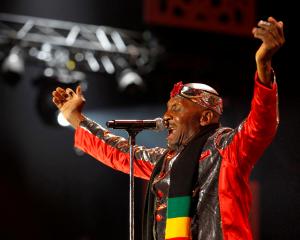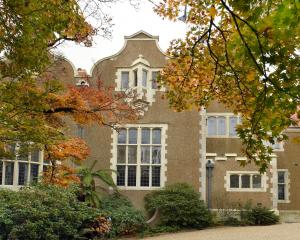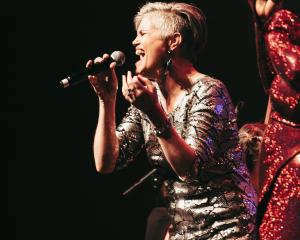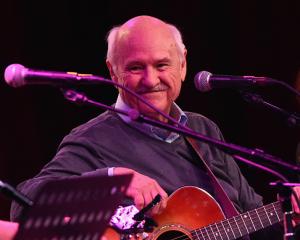By the time you read this, Matt Joe Gow will be four gigs into a tour schedule that comprises about 50 shows in various parts of Australia.
By the time he gives his voice a rest, it will be the end of October.
Still, this singer-songwriter with a country swagger is used to travelling.
And when you've made the album you've always wanted to, one redolent with the influences of Townes Van Zandt, Ryan Adams and others, well, that's just more reason to whip up a dust storm or two in the outback.
The former Otago Boys High School pupil who headed to the University of Otago to complete a degree in philosophy, then left in 2000 for Canada, the United States, Europe and England to "see what was out there", has wound up in Melbourne.
And though he's recently had to move from an east St Kilda flat because he was playing music "too loud, too late", the Victorian capital is going to be home-base for a while.
"It wasn't until I got to Melbourne in 2006 that I realised I could connect with people. The music I was writing was making sense and I focused on more of a bittersweet sentiment rather than a morbidly depressing one," Joe Gow explains.
"I started playing solo around here and, one by one, like-minded people would turn up to shows, or I'd hear about a person through someone else. I was playing solo for a year then started to form a band."
That band, the Dead Leaves, comprising drummer Joel Witenberg, guitarist Andrew Pollock and bass player Kain Borlase, has been together 18 months and now shares the bill on the debut album, The Messenger, released in New Zealand today.
It's not Matt Joe Gow and a group of session men; it's Matt Joe Gow and the Dead Leaves, reflecting the fact that though Joe Gow writes the tunes, he requires a strong vehicle to take them places.
Like some of the music from Joe Gow's home country, there is a range of Australian acts (for instance, the Triffids, the Go-Betweens and, more recently the Panics) that convey a sense of space, of land and landscape.
They are pictures to which the 30-year-old is drawn; he also draws a few of his own.
"With me coming from Dunedin and having that sense of space that you wouldn't have growing up in a different type of city ... I think that filters through in elements," Joe Gow reflects.
"Growing up in Dunedin, it was difficult being at the southern end of the world; there was not that much of an industry apart from the Flying Nun thing, but in terms of the energy and interest in music, it was high. Everyone was in a band and there were a lot of venues to play in.
"I've performed from an early age. I started playing piano when I was 5, but it wasn't until I was about 13 - I was writing a lot of poetry as a kid, too, but I didn't realise how to combine the two - that I started to sing and play guitar and drums and other things. That got me into bands.
"The band I was in when I was 15 was called Dubious. We were just a bunch of kids playing god-awful music. The thing was, there was still somewhere for us to play.
"We played at this place called Ruby In The Dust; we would hire out a room there and just play there for schoolkids. We packed out the rafters; we didn't even pay for that side-room ... I thought, `yeah, this is how it is'. But it's not that easy out there any more, I tell you."
And he should know.
Having spent time in the US and Canada as a child (his father held research posts at various universities), Joe Gow returned to live in Canada.
There, he formed a band, Tearlighter, which relocated to England following record label interest.
"Basically, it was about trying to figure out how the industry was going to work ... it was difficult to hold a band together. Tearlighter had an opportunity to work with a label but we fell apart and on the back of that I started to play solo," explains Joe Gow, who recorded a solo EP in England in 2005 then promptly left for Melbourne.
It has proved to be a good move: The Messenger has been released by Liberation, which operates under the umbrella of Australian music publishing outfit Mushroom.
The company paid for the services of influential Australian producer Nash Chambers, whose credits range from Dolly Parton to Jimmy Barnes, as well as members of Chambers' own family, sister Kasey and father Bill.
"He is obviously a big producer; he's won a lot of Arias and sold a lot of records, so we were really lucky to have him on board," Joe Gow says.
"I'd say my songs were mainly formed before we went in to work with him; the label just thought it would be a good fit in terms of how he could work with the sound."
Though The Messenger is a polished effort, it also benefits from being a little rough around the edges.
That was deliberate, says Joe Gow.
"I love [Bob Dylan's] Nashville Skyline. Listen to Girl From The North Country where Johnny Cash and Dylan are making up lyrics and getting them wrong ... I like that.
"We played it live, did the vocals live ... Nash allowed us to do that. That's how he records. He doesn't believe in pre-production and I guess that's lucky because he didn't go in and chop things up.
"I guess I'm lucky as a songwriter: either he let me away with it or believed in what I was doing."
The Dead Leaves' line-up was augmented by former Midnight Oil guitarist/keyboardist Jim Moginie and Bill Chambers, "an amazing lap steel player" who lends texture to a couple of tracks, as do guest pianists, fiddlers and pedal steel players.
The result is an album bedded in the country genre.
"It's an album I've wanted to make for a long time," Joe Gow says.
"When I was young and playing in Dunedin, I didn't know how to really realise the music I was listening to.
"I didn't understand how to use the influences of all the stuff I listen to, the stuff my mum listens to - she's a big fan of blues, Southern American rock 'n' roll, Dylan and Cash and Townes Van Zandt - I didn't know how to use those influences in a rock 'n' roll context until the late '90s when Wilco and Whiskeytown came through.
"We try to cover a lot of ground in between, from balls-down country like Come To Mama.
"But at the heart of the album is a theme I felt was so prevalent to country music, which is that bittersweet sentiment of loss, without it being overly depressing: songs like Steady Life, Things Fall Apart, It's Not Hard; these touch on themes that Gillian Welch and Ryan Adams do so well."
Joe Gow likes to keep busy. He has already written the next album.
In fact, with 50 or 60 songs up his sleeve, he could have several releases up his sleeve, but that's not how he operates.
Instead, he'll whittle the tunes down to nine or 10.
"I think any true songwriter likes to write songs regardless of whether they will be released or not. I like playing guitar; I like singing; it's what I do. I just like to write music.
"Anyone I'm influenced by is playing because they are trying to say something or get something off their chest or were writing it for themselves.
"I think you've got to think about yourself first then, as you arrange it instrumentally, you can think about how people will perceive it. But at the initial stages, it has to be about yourself. Otherwise, it's not very honest."
The conversation winds to a natural close.
That's lucky given Joe Gow has another 10 interviews to do this day as well as a series of radio shows.
Still, he's interested to know when his words will find a wider audience.
"Is the article going to feature in the next couple of weeks?" Yes.
"Great. I'll tell my mum ... My mum is my best supporter."














